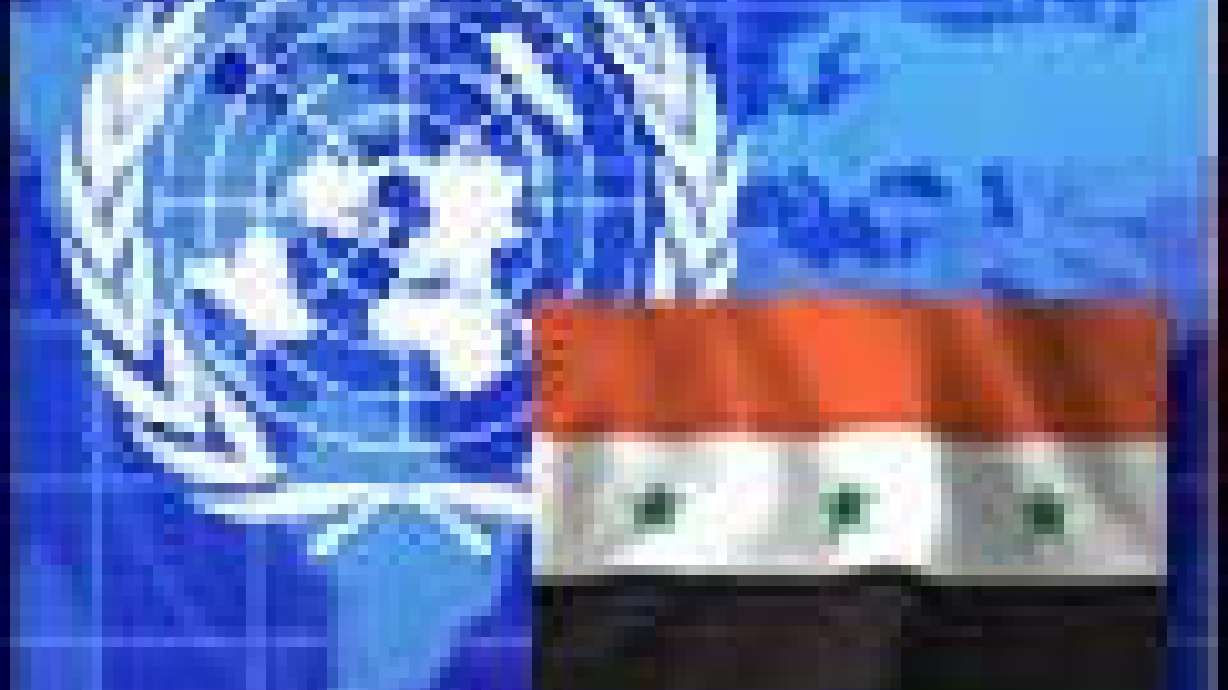Estimated read time: 5-6 minutes
This archived news story is available only for your personal, non-commercial use. Information in the story may be outdated or superseded by additional information. Reading or replaying the story in its archived form does not constitute a republication of the story.
UNITED NATIONS (AP) -- U.S. and Iraqi officials asked the United Nations on Monday to send a team to study the possibility of holding elections in Iraq, a key issue in Washington's dispute with a leading Shiite cleric over plans for creating a transitional government by July 1.
Secretary-General Kofi Annan said he wanted more details on the mission, but he acknowledged the issue was urgent and said he hoped for a speedy decision.
He said he expects the United Nations to play "an important role" from July onwards in helping the Iraqis draft a constitution and prepare for general elections which under a Nov. 15 agreement must be held by the end of 2005.
Annan spoke to reporters after meeting behind closed doors for over two hours with the top U.S. administrator in Iraq, L. Paul Bremer, members of the Iraqi Governing Council and U.S. and British officials to discuss the future U.N. role in Iraq.
The issue of elections is at the center of a dispute between Washington and Iraq's top Shiite Muslim cleric that could mar the handover of power. Ayatollah Ali al-Sistani wants direct elections to choose a national assembly. The current plan calls for local caucuses to choose the body so a provisional government can take power in Iraqi by July 1. U.S. administrators in Iraq say there's no time to organize an election before then.
Annan said all parties agreed that further technical discussions should take place on security and electoral issues related to sending a U.N. team.
He said one issue that the technical experts would look at was the possible use of ration cards to determine voter rolls in an election -- which he said would have to take place in May, if it were held.
Bremer said the technical discussions would begin Monday afternoon.
Asked about reconsidering the possibility of elections, Bremer said, "We think that that is a legitimate question and one where the U.N. with its expertise in elections can offer a perspective."
Bremer has said elections cannot be organized in time to meet the June 30 deadline, given the ongoing violence and lack of voter rolls. Annan has backed that view, but he called for the process of choosing an interim assembly to be expanded to include all segments of Iraqi society and to be fully transparent.
"I don't believe there may be enough time between now and May to hold elections," Annan reiterated Monday, but if he decides to send a team it will "look into that further and report to me."
The secretary-general indicated that he was leaning toward sending a team, reiterating that "the stability of Iraq is everyone's business."
"I think we have an opportunity to work together to move forward. So I'm going to look at it critically and operationally to help the process. ... If we get it wrong at this stage, it may be more difficult and we may not even get" to the next stage when an interim Iraqi government takes power.
Adnan Pachachi, the current Governing Council president, called it "a very useful discussion."
"We are not disappointed at all," he said, saying Annan explained the U.N.'s "understandable and legitimate" security concerns.
Pachachi said the issue of holding elections must be resolved by the end of February, when the Iraqis will implement basic laws for the handover and transition.
Asked about reconsidering elections, he said, "We should not stick to rigid positions on these matters and we've got to find ways and means to deal with problems as they arise and I think this is a very healthy way of managing the affairs of our country."
The secretary-general invited the coalition and the Governing Council to meet to clarify the job they would like the world body to do during Iraq's transition.
Initially, the United States said it was up to the Governing Council to discuss the U.N. role with Annan. But as the dipsute with al-Sistani intensified, the administration decided to send Bremer to Monday's meeting.
Nine Iraqis representing the Governing Council participated, led by Pachachi.
Bremer's British deputy, Jeremy Greenstock, is also in the talks along with high-level delegations from London and Washington. While coalition officials are pressing for the speedy return of U.N. staff, who were pulled out of Iraq after two bombings last year, Annan has stated repeatedly that the security conditions there are still too dangerous. A deadly suicide bombing Sunday at the gates of the U.S.-led coalition headquarters in Baghdad was likely to reinforce that view.
Despite serious differences with the United Nations over the U.S.-led war in Iraq, the Bush administration also is reaching out to the world body for help in ensuring a smooth transfer of sovereignty to an interim Iraqi government by July 1.
The U.S.-led coalition that has occupied the country since ousting Saddam Hussein in April has called for provincial caucuses to choose an assembly that would form an interim government, according to a blueprint for Iraqi sovereignty adopted Nov. 15.
American forces will stay in Iraq after the transfer of power, but in fewer numbers. They will gradually transfer security responsibilities to the Iraqis, thereby reducing the risk of American casualties as President Bush campaigns for re-election.
But al-Sistani has demanded direct elections for the legislature, which he says should then have a voice in whether coalition troops stay in Iraq beyond the transfer of power.
(Copyright 2004 by The Associated Press. All Rights Reserved.)









